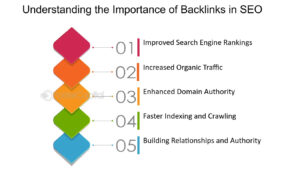Backlinks play a crucial role in the list of search engine evaluators for the relevance, trustworthiness, and authority of your website. Your website’s chances of ranking higher in search engine results is greater if there are more high-quality backlinks.
In the world of SEO, backlinks are like votes of confidence from other websites. The more reputable sites link to your content, the more trustworthy your website appears to search engines. But here’s the catch: not all backlinks are created equal—and building them the wrong way can actually hurt your rankings.
In this guide, you’ll learn how to build high-quality backlinks in 2025 using ethical, sustainable strategies that won’t trigger Google penalties.
Why Backlinks Matter for SEO?
Backlinks (also called inbound links) are links from one website to another. Search engines like Google view them as signals of authority and relevance. When a high-authority website links to your content, it essentially vouches for your credibility.
Benefits of quality backlinks:
- Higher search engine rankings
- Increased organic traffic
- Faster indexing by Google
- Improved domain authority
What Makes a Backlink “High-Quality”?
Not all backlinks carry the same weight. Here’s what makes a backlink valuable:
- Relevance: The linking site is in your niche or closely related field.
- Authority: The domain has strong credibility (e.g., high Domain Rating or Domain Authority).
- Natural placement: The link appears within content, not spammed in footers or comment sections.
- Dofollow vs. Nofollow: Dofollow links pass SEO value; nofollow links don’t—but both have their place.
- Anchor text: Natural, keyword-relevant anchor text (not over-optimized or generic like “click here”).

Safe & Smart Strategies to Build Backlinks in 2025
1. Create Link-Worthy Content
The foundation of great backlinks is content people want to link to. Focus on:
- In-depth guides and tutorials
- Original research or case studies
- Infographics or visual data
- Free tools or calculators
- Trending or newsworthy articles
💡 Pro Tip: Create “Skyscraper Content”—take an existing popular article, make it better, and reach out to those who linked to the original.
2. Guest Blogging (Still Works—If Done Right)
Writing blog posts for other websites in your niche is still one of the most effective and safe ways to earn backlinks.
Tips for guest posting:
- Choose reputable blogs (with real traffic)
- Avoid spammy guest post networks
- Write genuinely useful, non-promotional content
- Use relevant, non-keyword-stuffed anchor text
🎯 Target: Sites with DA 30+ and a relevant audience.
3. Use HARO (Help A Reporter Out)
HARO connects journalists with expert sources. Responding to queries can land you links from major publications like Forbes, Business Insider, or Entrepreneur.
How to do it:
- Sign up for HARO and monitor daily queries
- Respond quickly with clear, value-packed insights
- Include your name, title, and website
These links are often high-authority and editorially placed—SEO gold!
4. Build Relationships, Not Just Links
Networking with other creators in your industry can naturally lead to backlinks.
Ways to build relationships:
- Comment on blogs and social media posts
- Share others’ content and tag them
- Join niche communities (Slack groups, Reddit, LinkedIn groups)
- Offer collaborations like podcast swaps or joint webinars
Backlinks become a natural byproduct of real connections.
5. Use the Broken Link Building Method
Find broken links on other sites and suggest your content as a replacement.
How to do it:
- Use tools like Ahrefs or Check My Links to find broken outbound links
- Reach out to the site owner with a polite message
- Offer your similar (or better) content as a replacement
This method is helpful, non-pushy, and often gets a good response rate.
Backlink Strategies to Avoid (Or Risk Getting Penalized)
Some practices can trigger a Google penalty or algorithmic demotion. Avoid these at all costs:
- Buying backlinks (especially in bulk or from shady sites)
- Automated link-building software
- Comment spamming or forum spamming
- Over-optimized anchor text (like “best cheap SEO tools USA 2025”)
- Link exchanges (“I’ll link to you if you link to me”)
Remember: Google’s algorithms are smarter than ever—manipulative tactics are no longer worth the risk.
Final Thoughts: Quality Over Quantity Always Wins
The key to long-term SEO success isn’t just more backlinks—it’s better backlinks. Focus on building real authority through great content, genuine outreach, and ethical methods. If you stay consistent and keep adding value, backlinks will come naturally.

